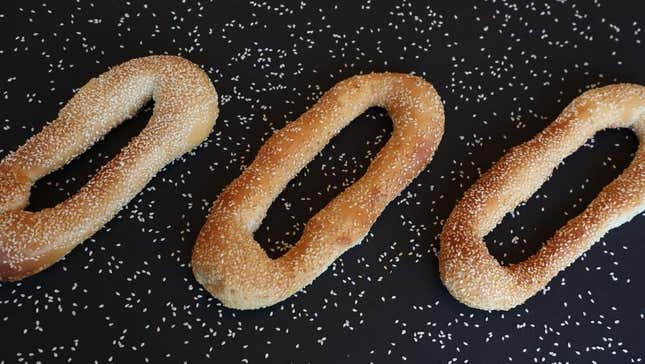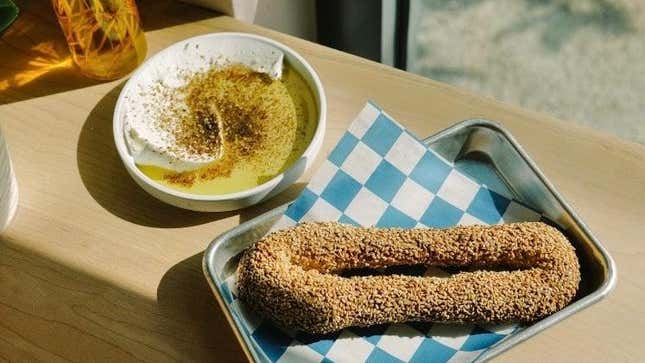
Yom Kippur, the holiest day of the Jewish calendar, falls on Monday. Before fasting, many families are already planning what they’ll serve at Break Fast, the meal served after the holiday concludes. This year, there might be more Jerusalem bagels on Americans’ tables than ever before.
Named for the city where they are ubiquitous, Jerusalem bagels might not be as familiar to many lovers of conventional bagels, which hail from Europe. But they are widely found in Israel and other parts of the Middle East, where they are known in Arabic as kaak al quds or kaak bread. Writer Luay Gafari of Urban Farm and Kitchen says the name comes from street vendors, who would yell “Ka’ak! Ka’ak!” to get customers’ attention.
The elongated oval bagels have steadily made the journey from the Mediterranean and are popping up across the United States, from New York City to Ann Arbor, Michigan and New Orleans. Author David Lebovitz featured Jerusalem bagels in his Substack newsletter this July after a recent visit to Israel.
I first tasted this type of bagel during the pandemic, when New York baker Liron Egozi held a pop-up in Ann Arbor called The Bread Project Bakery. Her long, sesame-studded bagels provided a welcome diversion during endless stay-at-home days.
Breanne Kostyk, owner of Flour Moon Bagels in New Orleans, discovered the bagels by way of Philadelphia, where they are a feature at K’Far Cafe.

“Jerusalem bagels seem to be gaining a lot more popularity in the States in recent years, but it’s not something you would typically find in an everyday bagel shop,” Breanne Kostyk, owner of Flour Moon Bagels in New Orleans, tells The Takeout.
In case you aren’t familiar with them, here is a primer on the style.
What is a Jerusalem bagel?
A Jerusalem bagel, or J-bagel as some fans call it, is an oblong bagel, around twice the length of a conventional bagel (some are even longer). If you are a fan of Kringle, the ring-shaped Wisconsin pastry, a J-bagel looks something like that, minus the icing and fillings.
They’re much thinner than the plump, circular bread roll that most of us think of when we picture a bagel. Many people compare their taste to that of Montreal bagels, which are chewier and sweeter than typical bagels.
How Jerusalem bagels are made
The dough, whose ingredients most often include flour, milk or milk powder, and yeast, is rolled into a log and then worked into the signature oval shape. “The trickiest part is stretching them out that far without tearing them,” Kostyk says.
Besides their roots, the biggest difference between a J-bagel and a regular bagel is that a J-bagel is not boiled before baking. After being shaped, it gets a second rise, and then honey is spread on top before sesame seeds are added. The J-bagels bake at a high temperature, about 425 degrees Fahrenheit, for about 15 to 18 minutes, a little shorter than a typical bagel.
The best way to eat Jerusalem bagels
Flour Moon Bagels calls its J-bagel “The Big Dipper,” which is exactly how many people choose to eat it. Available Friday through Sunday, the bagel is served with warm labneh and olive oil sprinkled with za’atar spice. Rather than spreading anything onto the bagel itself, you instead tear off a piece of bagel and dip it into the yogurt and oil.
“I enjoy the rustic street food handheld approach and the simple pleasure of being able to rip and dip a warm piece of bread,” Kostyk says, noting that Flour Moon sells a couple dozen J-bagels per day on the weekends.
Jerusalem bagels also can be served with butter, jam, and cream cheese. Breads Bakery in New York features its J-bagels on the party platters it is selling for the holiday, complete with lox, tomato, and other traditional bagel accompaniments. K’Far Cafe in Philly, meanwhile, offers bagel sandwiches, including a Jerusalem bagel grilled cheese.
J-bagels probably should be eaten on the day you purchase them. They can be stored in a plastic bag, but they tend to get soft after about 24 hours; you can freeze them, too. If you go that route, I recommend reheating them in the oven on parchment, rather than toasting them, to crisp them back up.